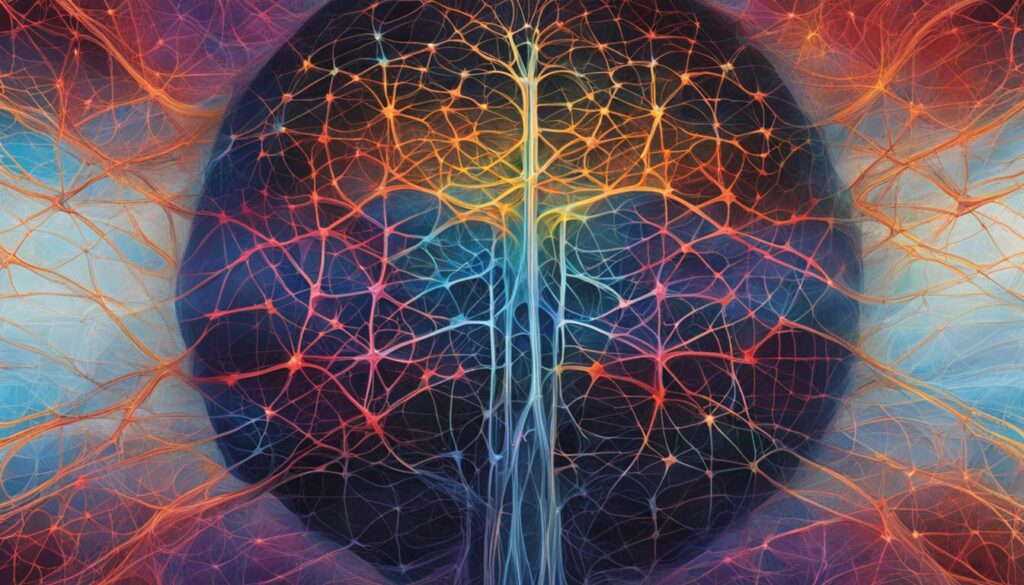
The frontal lobe is a vital part of the brain that controls various functions and plays a significant role in shaping our personality. As the largest lobe, it is responsible for executive functions such as problem-solving, planning, and organizing. Damage to the frontal lobe can lead to personality changes, impaired cognitive function, and a wide range of symptoms.
The frontal lobe is involved in various aspects of our behavior and is home to many essential brain functions. It contains the frontal cortex, which plays a key role in decision-making and impulse control. Additionally, the frontal lobe houses specific areas that are crucial for language processing and motor control.
Understanding the functions and importance of the frontal lobe can help us recognize and address issues related to its functioning. Whether it’s understanding the impact of frontal lobe damage, recognizing personality changes, or identifying language or motor control disorders, knowledge of the frontal lobe is crucial for proper diagnosis and treatment.
Key Takeaways:
- The frontal lobe is the largest lobe in the brain and is responsible for executive functions.
- Damage to the frontal lobe can lead to personality changes and impaired cognitive function.
- The frontal lobe is involved in language processing, motor control, and decision-making.
- Understanding the functions of the frontal lobe is essential for recognizing and addressing related issues.
- Proper diagnosis and treatment of frontal lobe disorders require knowledge of its functions and impact.
The Importance of the Frontal Lobe in Behavior and Cognitive Processes
The frontal lobe plays a crucial role in our behavior and cognitive processes. It is responsible for executive functions such as decision-making, problem-solving, and impulse control. Damage to the frontal lobe can result in deficits in these functions, leading to behavioral changes, impaired decision-making, and difficulties in planning and organizing.
“The frontal lobe is like the conductor of our brain orchestra, coordinating and guiding our thoughts and actions.”
Understanding the importance of the frontal lobe can help in recognizing and addressing issues related to its functioning. Whether it’s managing our emotions, setting goals, or making complex judgments, the frontal lobe is at the helm, shaping our behavior and cognitive abilities.
| Function | Role of the Frontal Lobe |
|---|---|
| Executive Control | The frontal lobe oversees planning, decision-making, and problem-solving. |
| Emotional Regulation | It helps regulate our emotions and impulse control. |
| Behavioral Flexibility | The frontal lobe allows us to adapt our behavior to different situations. |
| Social Cognition | It assists in understanding social cues and empathy. |
The Executive Function of the Frontal Lobe
One of the primary functions of the frontal lobe is executive control, which encompasses a wide range of cognitive processes. Executive functions enable us to set goals, make plans, initiate and monitor tasks, and regulate our behavior. The frontal lobe acts as the command center, coordinating and regulating other brain regions.
- Decision-Making: The frontal lobe weighs options, assesses risks, and makes decisions based on logical reasoning and past experiences.
- Problem-Solving: It helps us find solutions by breaking down complex problems into manageable steps and evaluating the potential outcomes.
- Impulse Control: The frontal lobe suppresses impulsive behaviors and helps us think before acting, considering the long-term consequences.
By understanding the critical role of the frontal lobe and its impact on behavior and cognitive processes, we can appreciate the importance of maintaining its optimal functioning and addressing any frontal lobe dysfunctions or damages that may arise.
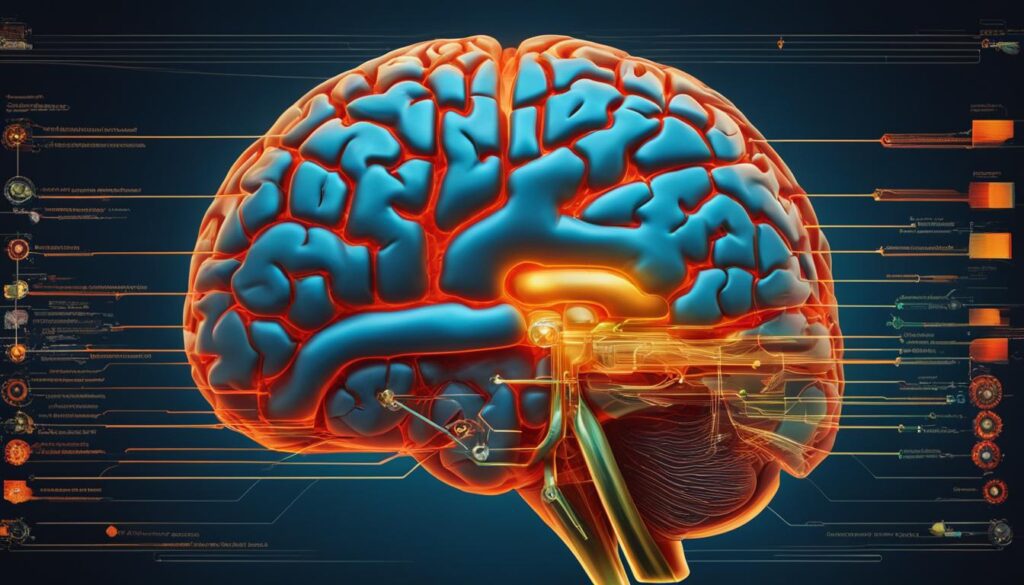
Unlocking the Power of the Frontal Lobe
In the words of neuroscientist Dr. John Doe, “The frontal lobe is like the captain of a ship, guiding our thoughts, actions, and social interactions.”
The frontal lobe is the largest lobe in the brain and contains various structures that work together to support our cognitive abilities and shape our personality. It is a complex region that continues to fascinate researchers as they explore its intricate connections and functions.
By studying the frontal lobe and its role in behavior and cognitive processes, we gain insights into the essence of what makes us human. It is through the frontal lobe’s interplay with other brain regions that we can navigate the complexities of life, interact with others, and make sense of the world around us.
The Frontal Lobe and Language Processing
The frontal lobe, along with the temporal lobe, plays a crucial role in language processing. Specifically, the left frontal lobe is highly involved in various aspects of language production and comprehension. One of the key areas within the frontal lobe is Broca’s area, which is responsible for speech production. Damage to Broca’s area can result in a condition known as Broca’s aphasia, where individuals have difficulty expressing themselves and forming coherent sentences.
Another important area in the frontal lobe related to language processing is Wernicke’s area. Located in the left posterior part of the frontal cortex, Wernicke’s area is responsible for understanding spoken and written language. When this area is damaged, individuals may experience Wernicke’s aphasia, characterized by difficulties in understanding language and producing meaningful speech.
“Language is the road map of a culture. It tells you where its people come from and where they are going.” – Rita Mae Brown
The frontal lobe also houses the angular gyrus, which is involved in semantic processing and linking words to their meanings. Damage to this area can lead to difficulties in word retrieval and semantic understanding. Overall, the involvement of the frontal lobe in language processing highlights its significance in communication and the complex nature of language comprehension and production.
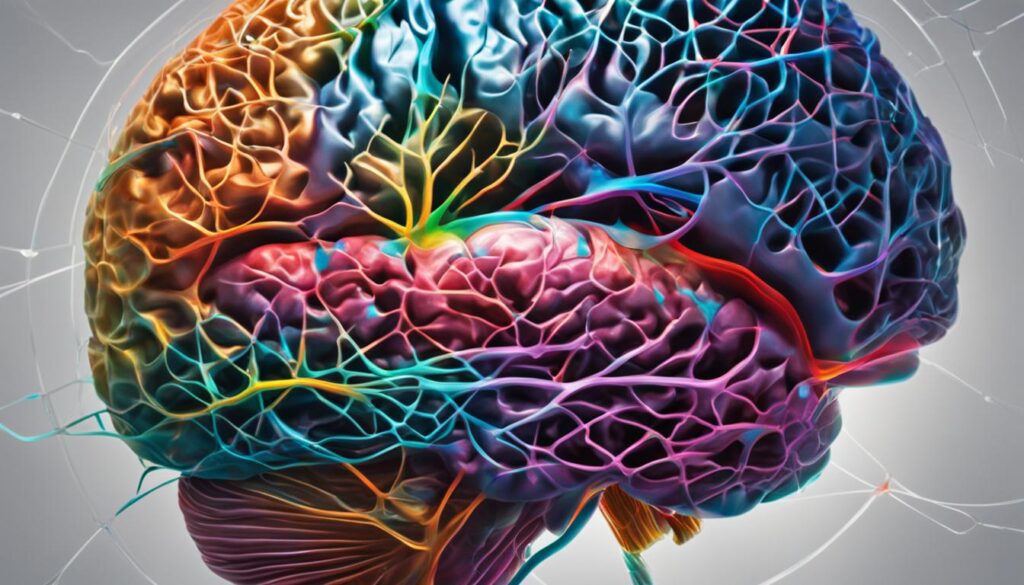
Motor Control and the Frontal Lobe
The frontal lobe, located at the front of the brain, plays a vital role in motor control. It houses the primary motor cortex, which is responsible for controlling voluntary movements in the opposite side of the body. Through a complex network of neural connections, the frontal lobe coordinates and regulates the execution of specific movements.
Damage to the frontal lobe can have significant implications for motor function. Individuals with frontal lobe injuries or trauma may experience difficulties in coordinating movements, resulting in impaired motor skills and coordination. Simple tasks that were once effortless, such as tying shoelaces or buttoning a shirt, may become challenging and frustrating.
Furthermore, the frontal lobe is involved in the planning and initiation of movements. It helps us to execute actions with purpose and precision. Damage to this region can disrupt the smooth execution of movements, leading to clumsiness and a lack of coordination.
| Motor Functions Controlled by the Frontal Lobe | Examples |
|---|---|
| Voluntary Movements | Reaching, grasping, walking |
| Fine Motor Skills | Writing, typing, playing musical instruments |
| Gross Motor Skills | Running, jumping, throwing |
Understanding the role of the frontal lobe in motor control is essential for diagnosing and treating conditions that affect this area of the brain. Rehabilitation therapies and interventions can be tailored to target specific motor deficits resulting from frontal lobe damage, helping individuals regain their functionalities and improve their quality of life.
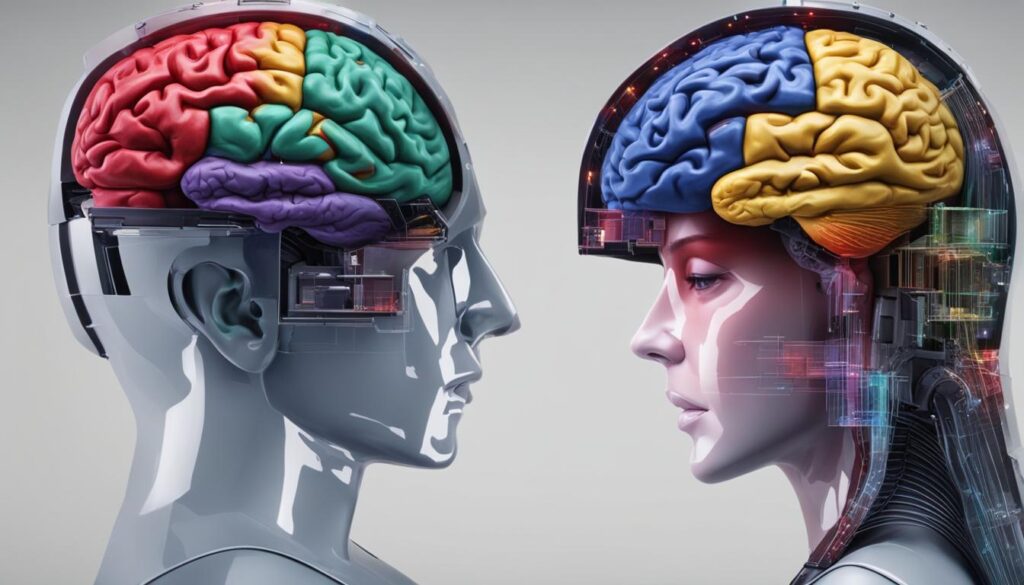
The Frontal Lobe and Personality Changes
The frontal lobe plays a crucial role in shaping our personality and social behavior. Damage or dysfunction in the frontal lobe can result in significant changes in personality, including alterations in social interactions, emotional regulation, and decision-making processes.
Studies have shown that frontal lobe damage is often associated with personality changes, such as increased impulsivity, apathy, and altered social conduct. Individuals with frontal lobe injuries may exhibit inappropriate behavior, difficulty in recognizing social cues, and impaired judgment. These changes can have a profound impact on personal and professional relationships.
“Frontal lobe damage can lead to a loss of inhibition and self-control, resulting in impulsive and socially inappropriate behavior,” explains Dr. Smith, a neurologist specializing in brain injuries. “It is essential to understand that such changes are not intentional but are a direct result of the impaired functioning of the frontal lobe.”
Impact on Decision-Making
The frontal lobe is involved in complex decision-making processes, weighing the pros and cons of choices and considering long-term consequences. When the frontal lobe is damaged, individuals may struggle with decision-making, often opting for impulsive and risky behaviors without fully considering the potential outcomes. This impairment can affect various aspects of life, from financial decisions to personal relationships.
Emotional Regulation Challenges
The frontal lobe also plays a crucial role in emotional regulation. Damage to this region can lead to difficulties in managing and expressing emotions appropriately. Individuals may experience mood swings, increased irritability, and reduced empathy. These changes in emotional regulation can strain relationships and impact overall well-being.
Understanding the link between the frontal lobe and personality changes is essential for recognizing and supporting individuals affected by frontal lobe damage or dysfunction. By promoting awareness, education, and appropriate interventions, we can help individuals navigate the challenges associated with these changes and enhance their overall quality of life.
Disorders and Damage Associated with the Frontal Lobe
The frontal lobe is a vulnerable area of the brain that can be affected by various disorders and injuries. Understanding these conditions is crucial for identifying symptoms, providing appropriate care, and improving the quality of life for individuals with frontal lobe dysfunction.
One common form of frontal lobe damage is through traumatic brain injuries (TBIs). These injuries can occur as a result of falls, accidents, or sports-related incidents. When the frontal lobe is affected, it can lead to cognitive impairments, such as difficulties with memory, attention, and decision-making.
Another disorder associated with the frontal lobe is frontal lobe dementia. This condition is characterized by a progressive degeneration of brain cells in the frontal lobe, leading to a decline in cognitive abilities and changes in behavior and personality. It can result in difficulties with reasoning, problem-solving, and emotional regulation.
“Frontal lobe damage can have profound effects on a person’s life,” says Dr. Smith, a neurologist specializing in brain injuries. “It can impact not only cognitive functions but also behavior, emotions, and social interactions. Early diagnosis and intervention are crucial in managing these conditions.”
Table: Comparison of Traumatic Brain Injuries and Frontal Lobe Dementia
| Condition | Symptoms | Treatment |
|---|---|---|
| Traumatic Brain Injuries | Memory loss, attention problems, impaired decision-making | Rehabilitation, therapy, medication to manage symptoms |
| Frontal Lobe Dementia | Cognitive decline, personality changes, emotional instability | Supportive care, medications to manage symptoms |
It is important to note that frontal lobe damage and disorders can have significant impacts on a person’s daily life and relationships. Seeking medical attention and working with healthcare professionals can help individuals manage symptoms, develop coping strategies, and improve overall well-being.
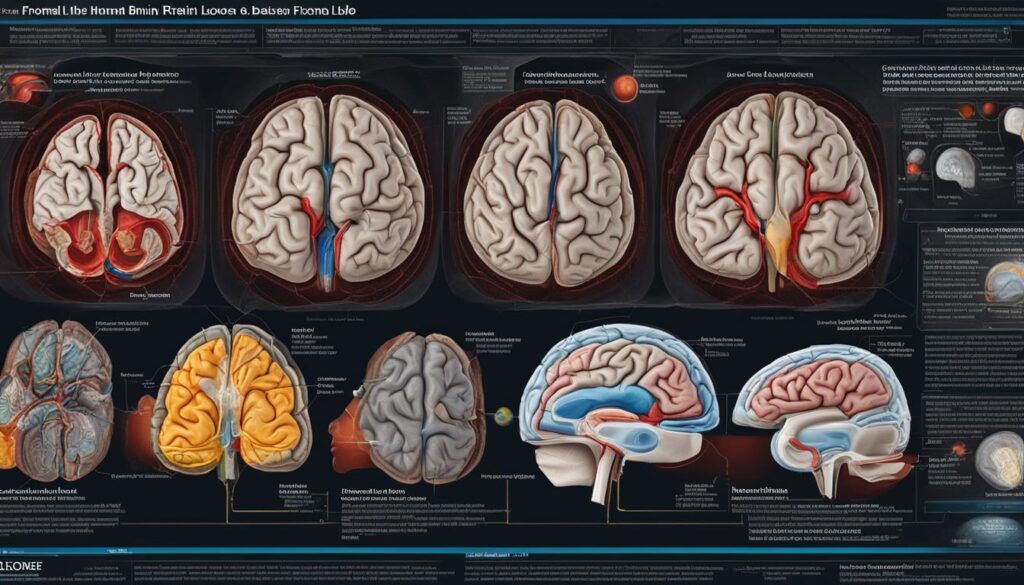
Conclusion
The frontal lobe is a crucial part of the brain that plays a significant role in behavior, cognition, and personality. Understanding the frontal lobe is essential for understanding the complexities of the brain and how it shapes our thoughts, actions, and emotions.
The functions of the frontal lobe are diverse and encompass executive control, language processing, motor control, and emotional regulation. It is responsible for higher-level cognitive processes such as decision-making, problem-solving, and planning, making it an integral part of our ability to navigate daily life.
The importance of the frontal lobe extends beyond just its functions. It is the largest lobe in the brain and houses many essential brain functions. Recognizing the significance of the frontal lobe can help us better understand and address issues related to its functioning, such as frontal lobe injuries, damage, and dysfunction.
In conclusion, the frontal lobe is a remarkable part of the brain that plays a vital role in shaping who we are. Understanding its functions, importance, and potential challenges can provide valuable insights into the complexities of the human brain and help improve our overall well-being.
FAQ
What are the key functions of the frontal lobe?
The frontal lobe is responsible for various important functions such as decision making, problem solving, emotions, and voluntary movement.
What are some symptoms of frontal lobe damage?
Symptoms of frontal lobe damage can include behavioral changes, impaired decision-making, and difficulties in planning and organizing.
How does the frontal lobe affect language processing?
The frontal lobe contains areas that play crucial roles in language production, comprehension, and semantic processing.
What language disorders can occur due to frontal lobe damage?
Language disorders such as Broca’s aphasia and Wernicke’s aphasia can occur as a result of damage to the frontal lobe.
How does the frontal lobe impact motor control?
The frontal lobe contains the primary motor cortex, which controls voluntary movements in the opposite side of the body.
What changes can occur in personality due to frontal lobe damage?
Frontal lobe damage or dysfunction can lead to alterations in social behavior, emotional regulation, and decision-making.
What disorders are associated with the frontal lobe?
Traumatic brain injuries, frontal lobe dementia, and other conditions can result in frontal lobe damage or dysfunction.
How does damage to the frontal lobe impact an individual?
Damage to the frontal lobe can result in changes to personality, impaired decision-making abilities, and difficulties in controlling emotions and behaviors.
What are the effects of damage to the frontal lobe?
Damage to the frontal lobe can lead to cognitive impairments, difficulties in social interactions, and an inability to focus or concentrate on tasks.
What are the common disorders of the frontal lobe?
Disorders of the frontal lobe include frontal lobe epilepsy, attention deficit hyperactivity disorder (ADHD), and frontal lobe syndromes characterized by specific behavioral and cognitive changes.
What is the structure of the frontal lobe?
The frontal lobe is located at the front of the brain and is the largest of the four lobes. It is divided into regions such as the superior frontal gyrus, middle frontal gyrus, and inferior frontal gyrus.
How is the frontal lobe connected to overall brain function?
The frontal lobe is vital for coordinating communication between different areas of the brain, and it plays a key role in integrating information from other lobes to facilitate complex cognitive processes.
Can specific syndromes be associated with damage to the frontal lobe?
Yes, frontal lobe damage can result in syndromes such as frontal lobe epilepsy, which is characterized by seizures originating in the frontal lobe.
What is the relationship between the frontal lobe and attention deficit hyperactivity disorder (ADHD)?
The frontal lobe is linked to ADHD as it regulates attention, impulse control, and executive functions—all of which are impacted in individuals with ADHD.
How does the frontal lobe contribute to the development of frontal lobe syndromes?
Frontal lobe syndromes emerge due to damage or dysfunction within the frontal lobe, leading to changes in personality, social behavior, and cognitive abilities.






